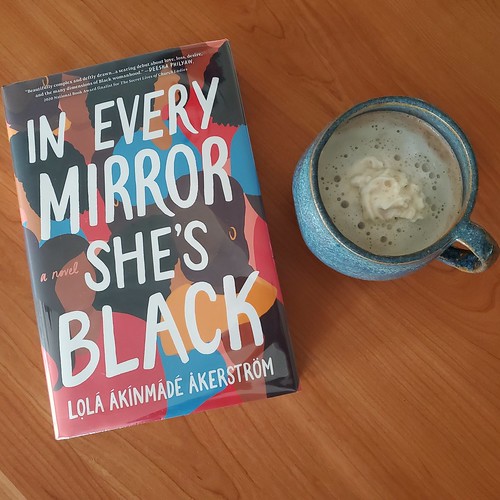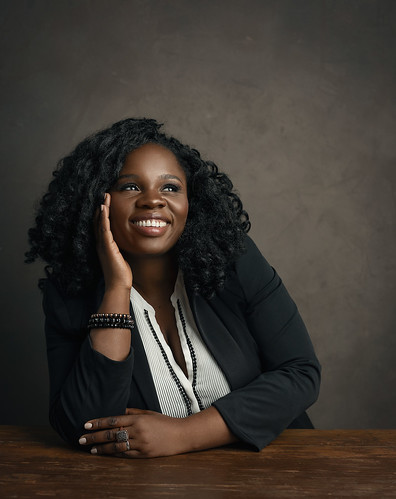We have long loved the creative artistry of Lọlá Ákínmádé Åkerström. She's a magnificent writer and photographer (check out our early interview with her here), a compelling speaker (listen to her TED talk!), and has a new book out that I absolutely DEVOURED.
We have much to learn about the world—and writing—from her.
In Every Mirror She's Black is a beautifully-written contemporary social novel that you won't want to put down (seriously: block out some time, arrange some snacks, and get the kettle brewing).

In Every Mirror She's Black is a tale of three women in one location (Sweden), and how they are intertwined in one way or another, sometimes in suprising ways. At the same time, each person's story (and life) has its own trajectory and history, which influences their actions, interactions, and dreams. Through these three diverse voices, this book explores what it means to be a black woman in a white society, and how cultural backgrounds and norms affect every aspect of life, wherever you are in the world.
In Every Mirror She's Black is extraordinary, powerful, and an outstanding novel. It is, by far, one of the best books I've ever read.
Why do I love this book so? Let me count the ways...
I love the characters, each richly drawn and envisioned. I root for them, am annoyed at them, want to know more about them.
The writing is captivating, and I keep going back to reread gorgeous sentences and powerful paragraphs.
I adore the fact that here, finally, is a novel about intercultural sensitivity and growth told through very different voices.
I am astounded by the genuine, realistic glimpse into cultural complexity, individual emotions, and how we never know all of a person.
Color me impressed by the social issues that background the books, including borders and refugees, income disparity, racism, motherhood, privilege, and mental health.
I've read it twice, and each time, have found more to ponder. As a lifelong learner of the intercultural experience, you can bet I'm on my third—and not final—read.

Highly, highly recommended.
About Ákínmádé Åkerström:
Having lived on three different continents — Africa, North America, and now Europe — for extended periods of time, Nigerian-American author Lọlá Ákínmádé Åkerström is drawn to the complexities and nuances of culture and how they manifest themselves within relationships.
Based in Stockholm, Sweden, Lọlá is an award-winning visual storyteller, speaker, and photographer. Her work has appeared in National Geographic, BBC, CNN, The Guardian, Sunday Times Travel, The Telegraph, New York Times, Travel + Leisure, Slate, Travel Channel, Adventure Magazine, Lonely Planet, amongst others. In addition to contributing to several books, she is the author of the following books–—2018 Lowell Thomas Award winner for best travel book, Due North and bestselling LAGOM: Swedish Secret of Living Well, available in over seventeen foreign language editions.
She has been recognized with multiple awards for her work, including 2018 Travel Photographer of the Year Bill Muster Award, and she was honored with a MIPAD 100 (Most Influential People of African Descent) Award within media and culture in 2018. She contributed to National Geographic's Image Collection.

Photographer credit: Jessica Wikström
We were so intrigued with the complexity and genuine realness of intercultural living in this novel that we asked Ákínmádé Åkerström to share some backstory to her writing the book, including inspiration, life experience, tracking character stories, social issues, and including the world in your writing. Here's what she had to say...
What inspired you to write this book?
I wrote a lot of fiction during my teenage years, but years later, I struggled rewriting some of those stories. It was while on vacation in Portugal a couple years ago that the idea for IEMSB came. I realized that the story I was meant to write at this stage of my life was much closer to my lived experiences. As a travel writer, I've experienced so many cultures and getting beneath their nuances. I have a deep relationship with Sweden and Swedish culture, I also spent time over two years visiting an asylum center here in Sweden, I know so many Black women across various socioeconomic profiles, and I am, after all, a Black woman who has lived here for over a decade. So I knew I needed to give space to some of our voices this way.
How does your life experience of living in several different cultures, and having a global, intercultural marriage influence your writing?
Absolutely! I try to write in a very transparent, organic way that isn't masked behind overly flowery prose to say what I want to say. I want to foster understanding in ways that are accessible and relatable. My purpose is tied to cultural connection and getting beneath our differences and similarities in ways that connect us. I must have been a cultural anthropologist in a different life. Also being in an intercultural, interracial marriage adds other dimensions of understanding that I have to navigate as well. Especially with two cultures that are quite polar opposites - Nigerian and Swedish.
Your characters are all so complete, each in their own way. I never felt like they didn't have a backstory, and I always want to read more about each one. How do you track the story arc to include everyone?
I actually spent 4-5 months thinking about, crafting, and outlining the characters before writing the book itself. I wanted to create fully-realized three dimensional characters - whether they are the main protagonists or side characters. Each of the women deserve their own books as well but I wanted to tell parts of their stories side-by-side to show that Black womanhood is not a monolithic experience, Black women have different values, and Black women also navigate various levels of privilege and class too.
You include many powerful social issues in this book. How can writers include this in both a sensitive and nuanced way?
For me, I couldn't write a book that tackled just one social issue because life is a lot more complex and nuanced than that. In reality, all these social issues flow into and affect each other, and I wanted to write a book that truly reflected reality. If you're writing about issues you personally don't have experience with, then researching as well as including beta and sensitivity readers to guide you is crucial. I had 12 beta readers provide feedback and 2-3 sensitivity readers crosscheck some of the more sensitive parts of the book. I also included an author's note at the end and added trigger warnings in the beginning.
What tips do you have for writers to include the world in their writing?
Some of the feedback I got from people who loved IEMSB is that I included bits of different languages into the writing - Yoruba, Somali, Arabic, and Swedish. It was set in a gorgeous city I call home, Stockholm. And it was written in a way that shows a truly multidimensional story of places we've always viewed through a one-dimensional lens - Sweden. The stereotypes of Sweden are often associated with blondes, meatballs, Volvos, and IKEA all living in utopia, but all the stories in IEMSB are valid and part of Sweden's fabric too.
The world is richly diverse, complex, and multidimensional. Bring all of this, both the positives and negatives, into your work. Every single one of my characters are messy and complex. That is what makes literature compelling, true to life, and relatable.
How can readers find your work?
IEMSB has its own social media accounts at @ineverymirror so be sure to share your reviews and photos of the book so our team can engage and reshare as well. I can be found at @LolaAkinmade and www.akinmade.com
Is there anything else you'd like to share?
Always stay true to your voice and vision as a writer. The manuscript for IEMSB was rejected over 70 times. I stuck with my voice and therefore, stuck through those painful rejections. Now we have four publishers across the globe including a German publisher, more foreign interest coming in, and a TV/film rights agent in the mighty UTA.
Your voice is more powerful than you think. You are allowed to exist without explanation even if you feel uninvited, unappreciated, and invisible. Never, ever let the world convince you that your struggles are invalid.
And I'll end with my absolute favorite quote from E. E. Cummings: "To be nobody-but-yourself—in a world which is doing its best, night and day, to make you everybody else—means to fight the hardest battle which any human being can fight; and never stop fighting."
